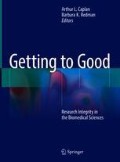Abstract
Plagiarism is using someone else’s text, ideas or results, without attribution, implying they are your own. While this can occur accidentally, plagiarism is done with an intent to deceive. The aim is the acquisition of scientific credit, publication credit, and ultimately to garner prestige and promotion. Self-plagiarism, the reuse of ideas and text from one’s own previous work, if referenced, is usually not a problem, especially if it appears in the materials and methods section of a series of papers reporting on a program of research. The antidote to plagiarism is citing sources and listing references. When you are not sure, cite.
Access this chapter
Tax calculation will be finalised at checkout
Purchases are for personal use only
References
Amos KA. The ethics of scholarly publishing: exploring differences in plagiarism and duplicate publication across nations. J Med Libr Assoc. 2014;102(2):87–91.
Higgins JR, Lin F-C, Evans JP. Plagiarism in submitted manuscripts: incidence, characteristics and optimization of screening—case study in a major specialty medical journal. Res Integr Peer Rev. 2016;1(13):1–8.
Pecorari D, Petric B. Plagiarism in second-language writing. Lang Teach. 2014;47(3):269–302.
Shafer SL. Plagiarism is ubiquitous. Anesth Analg. 2016;122(6):1776–80.
Additional Suggested Reading
Garner H. The case of the stolen words. Sci Am 2014 310(3):64–67. (Describes early development of Deja-Vu.)
Shafer SL. Plagiarism is ubiquitous. Anesth Analg 2016; 122(6):1776–1780. (Judgments about plagiarism made by journal editors cannot be rote but must be thought through.)
Author information
Authors and Affiliations
Editor information
Editors and Affiliations
Rights and permissions
Copyright information
© 2018 Springer International Publishing AG, part of Springer Nature
About this chapter
Cite this chapter
Caplan, A.L., Redman, B.K. (2018). Plagiarism. In: Caplan, A., Redman, B. (eds) Getting to Good. Springer, Cham. https://doi.org/10.1007/978-3-319-51358-4_7
Download citation
DOI: https://doi.org/10.1007/978-3-319-51358-4_7
Published:
Publisher Name: Springer, Cham
Print ISBN: 978-3-319-51357-7
Online ISBN: 978-3-319-51358-4
eBook Packages: MedicineMedicine (R0)

